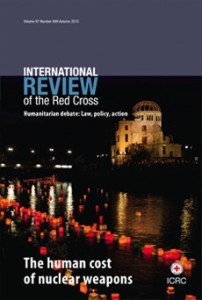The human cost of nuclear weapons
 A comprehensive, carefully documented study of the humanitarian consequences of nuclear testing in the Pacific region, written by IPPNW co-president Tilman Ruff, is one of the highlights of an important new issue of the International Review of the Red Cross (IRRC) on the human cost of nuclear weapons. The 468-page thematic edition of the flagship journal of the International Committee of the Red Cross chronicles the ICRC’s long history of engagement with the nuclear weapons issue, from the first Red Cross report on the effects of the US atomic bombing of Hiroshima, through ICRC participation at the recent series of international conferences on the Humanitarian Impact of Nuclear Weapons.
A comprehensive, carefully documented study of the humanitarian consequences of nuclear testing in the Pacific region, written by IPPNW co-president Tilman Ruff, is one of the highlights of an important new issue of the International Review of the Red Cross (IRRC) on the human cost of nuclear weapons. The 468-page thematic edition of the flagship journal of the International Committee of the Red Cross chronicles the ICRC’s long history of engagement with the nuclear weapons issue, from the first Red Cross report on the effects of the US atomic bombing of Hiroshima, through ICRC participation at the recent series of international conferences on the Humanitarian Impact of Nuclear Weapons.
As editor-in-chief Vincent Bernard points out in his lead editorial, the ICRC first called for the abolition of nuclear weapons less than a month after they were used in Hiroshima and Nagasaki, and has consistently opposed them ever since. He notes that the recent resolution of the International Red Cross and Red Crescent movement, urging governments “to pursue the prohibition and elimination of these weapons as quickly as possible” provided the impetus for this thematic edition of the IRRC.
“In light of what we know about the terrible consequences of the use of nuclear weapons,” Bernard concludes, “it is now more clear than ever that the international community must imperatively find a way to achieve total nuclear disarmament, through a ban treaty or otherwise. As long as nuclear weapons exist, there remains a risk that they might be detonated, and this must never happen again.”
The human cost of nuclear weapons begins, appropriately, with testimonies from Hibakusha—Hiroshima and Nagasaki survivors—including IPPNW regional vice president Masao Tomanaga. Contemporaneous newspaper accounts of the Hiroshima bombing are followed by reflections on the continuing danger posed by nuclear weapons 70 years later, including a thorough review of the nuclear arsenals and rearmament programs underway in all nine nuclear-armed states.
The journal’s writers cast a wide net, exploring the impact of nuclear weapons from medical, humanitarian, and legal perspectives. An especially valuable analysis of International Humanitarian Law (IHL) as applied to nuclear weapons, by Lou Maresca and Eleanor Mitchell, provides irrefutable evidence for the Red Cross Red Crescent position that the use of nuclear weapons must be banned.
While the ICRC has stopped short of demanding the across-the-board ban for which IPPNW and ICAN are campaigning, the journal provides ample space for ban treaty proponents to make their case. In her review of the ways in which the humanitarian impacts initiative has helped reframe the debate about nuclear weapons, Elizabeth Minor of Article 36 (an ICAN partner) writes: “The humanitarian initiative challenges the status that NPT-member nuclear-armed States have assumed for themselves as the legitimate nuclear weapons possessors – in contrast to illegitimate possessors outside the NPT regime – by considering the fundamental illegitimacy of nuclear weapons possession as a whole.”
“A treaty banning nuclear weapons,” Minor concludes, “would address the legal anomaly that these are the only weapons of mass destruction not specifically outlawed by a comprehensive international treaty…. By not only banning the use of these weapons but also articulating a comprehensive prohibition against them – as other weapons treaties do – it would both establish a framework and create more favourable conditions for elimination.”
The thematic issue concludes with a February 2015 speech by ICRC president Peter Maurer. “The catastrophic humanitarian consequences of nuclear weapons and current trends are too serious to ignore,” Maurer told the Geneva diplomatic corps. “The prohibition and elimination of these weapons through a legally binding agreement is the only guarantee that they will never be used again.”
International Review of the Red Cross, The human cost of nuclear weapons



Trackbacks
Comments are closed.